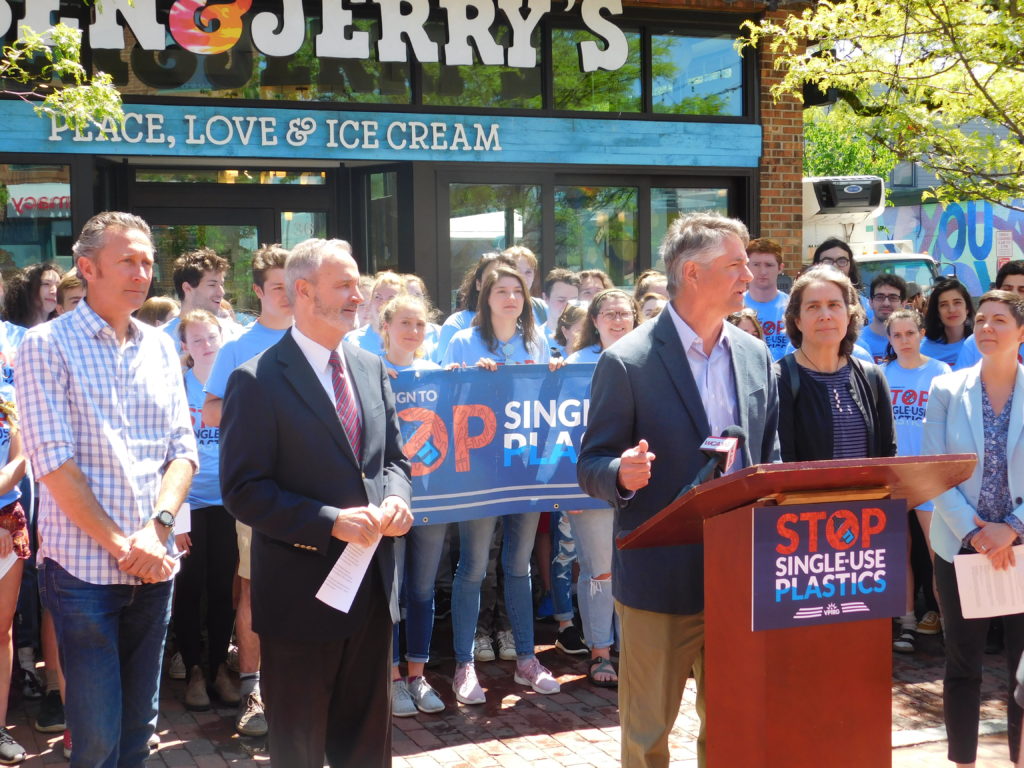Last month, Vermont legislators passed the most far-reaching statewide legislation in the nation to address the problem of single-use plastic pollution. Today, legislative champions of that bill joined with advocacy groups to urge Gov. Phil Scott to sign the legislation.
The bill (S.113), had overwhelming support in both the Senate (30-0) and the House (120-24). It takes aim at single-use plastic bags, straws, drink stirrers and expanded polystyrene.
“Plastic bags, straws, and polystyrene food containers clog up our recycling facilities, harm wildlife and litter our landscape,” said Representative Amy Sheldon (D-Middlebury), Chair of the House Natural Resources, Fish, & Wildlife Committee. “Banning them, like banning billboards, will distinguish Vermont as an environmental leader. I hope Governor Scott stands with the people of Vermont and signs S.113.”
Single-use plastics are a particularly pernicious form of pollution. With a useful life that is often no more than 15 minutes, this plastic can last in the environment for 500 years or more. Plastic pollution is choking our oceans and waterways, spoiling our environment, killing wildlife and threatening human health as well.
“It’s time for Governor Scott to put this law on the books,” said Jen Duggan, Vice President and Director of CLF Vermont. “These materials begin as dirty fossil fuels, expose us to harmful chemicals, and end up as litter and dangerous microplastics in our waterways. We can’t recycle our way out of this problem, and this bill is an important step forward in getting throwaway plastics out of Vermont.”
In passing S.113, Vermont lawmakers expressed concerns about the growing threat posed by single-use plastics. Global plastic production is increasing so rapidly that more plastic has been produced in the last 15 years than in all previous years combined.
“If you think that single-use plastics aren’t a problem in Vermont, think again,” said Paul Burns, Executive Director of the Vermont Public Interest Research Group. “Vermonters currently use at least 220 million single-use plastic bags per year. As for plastic straws, if each Vermonter used just one straw per week – a conservative estimate – that would equal 32.5 million straws per year in Vermont.”
Burns noted that that number of straws, stretched end to end, would reach nearly 3,600 miles; far enough to reach from Montpelier, VT to Montpellier, France.
Though plastic doesn’t biodegrade, it can eventually break down into tiny bits called microplastic, where it causes other, less visible threats. For instance, microplastics have been found in Lake Champlain, in tap water around the world, in 90% of bottled water, in sea salt, beer, and in fish, shellfish and other forms of wildlife. Hundreds of thousands of birds and marine animals die each year because of discarded plastics.
Plastic manufacturing began over a century ago, but widespread production increased dramatically after World War II. Over nine billion tons of plastic have been produced since then, and less than ten percent of that has been recycled.
Christopher Miller, Global Activism Strategy Manger at Ben & Jerry’s, noted that the company announced earlier this year that it will no longer offer plastic straws and spoons in any of its more than 600 Scoop Shops worldwide. The company also announced a plan to address plastic cups and lids used to serve ice cream by the end of 2020. “At Ben & Jerry’s, we understand that we can’t just recycle our way out of this problem,” Miller said. “We, and the rest of the world, need to get out of single-use plastic. That’s why we’re proud to stand with these activists and legislative champions today in urging Gov. Scott to sign the nation’s strongest anti-plastics bill into law.”
Today’s news conference took place outside the Ben & Jerry’s Scoop Shop on Church Street in Burlington.
Vermont bill S.113 is designed to ban the distribution of plastic bags, plastic drink stirrers, and expanded polystyrene food service products. It would also make straws available only upon request. More specific highlights of the legislation include:
- Plastic Bags: S.113 prohibits stores or food establishments from providing single-use plastic carryout bags to customers. This ban essentially applies to any carryout bag that is made of plastic and does not have stitched handles. Lawmakers were intentional about wanting to improve upon legislation elsewhere that allows the plastic bag industry to skirt bag bans by simply making thicker plastic bags. To further encourage the use of reusable bags, the Vermont bill also requires stores to charge 10 cents for every paper bag provided to a customer. Small paper bags would be exempt from this charge.
- Plastic Straws: S.113 prohibits establishments from automatically putting a plastic straw in their customers’ drinks. Instead, the bill allows for straws (not necessarily plastic) to be provided to customers upon request. Certain medical facilities are exempt from this restriction on plastic straws.
- Plastic Stirrers: The bill bans single-use plastic stirrers entirely.
- Expanded Polystyrene: No person will be allowed to sell expanded polystyrene (EPS) food service products or sell food or beverages in those same products under S.113. However, the law would not prohibit a person from storing or packaging a food or beverage in an EPS food service product for distribution out of state.
While passing S. 113 would be a major victory, the bill only begins to scratch the surface of the vast plastic pollution crisis. From eliminating unnecessary packaging to modernizing Vermont’s bottle bill, there’s a lot more we need to do. To learn more about VPIRG’s campaign to stop single-use plastics, visit https://www.vpirg.org/stop-single-use-plastics/.

